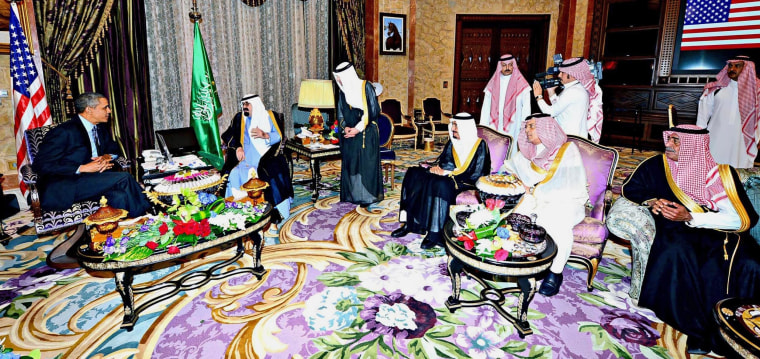For President Barack Obama, his trip to Saudi Arabia is, in many ways, an attempt to repair a frayed relationship with King Abdullah - but that's a heavy lift.
Contrary to briefings on Air Force One en route to Riyadh on Friday by senior officials, the Saudis do not believe their relationship with the United States "is in a stronger place today that it was in the fall," when tactical differences arose over the Assad regime's use of chemical weapons in Syria.
If it is "stronger" today, Saudi leaders say it's only because the relationship could hardly be worse than last Labor Day weekend, when Obama abruptly decided to seek congressional authority for punishing air strikes against Bashar al-Assad.
Members of the royal family say it was clear that the White House knew Congress would never approve (even limited) military action to enforce the president's previously stated "red line" on Assad's use of chemicals.
The Saudis do not believe their relationship with the United States 'is in a stronger place today that it was in the fall'
From the administration's perspective, the Saudi proposal to arm Syrian rebels with shoulder-fired antiaircraft missiles -- or manpads -- is alarmingly reminiscent of the support given to anti-Soviet forces in Afghanistan during the 1980's. That operation brought a Saudi expatriate named Osama bin Laden to Afghanistan to fight with the resistance. It’s also credited with giving early legs to the al-Qaida network.
There are other tensions between the United States and Saudi Arabia, and some are not Obama's fault.
Sunni Saudi Arabia is deeply suspicious of the administration's negotiations with the Iran's Shiite leaders over nuclear weapons. An overall lack of trust between Riyadh and Washington make it difficult to share policy goals.
The bottom line, according to a former top Saudi official: the king does not trust the American president, and Obama does not have a personal relationship with the Abdullah's closest advisers to break through this barrier.
Although the king did not host the president for dinner, their meeting Friday at Abdullah's elaborate desert retreat was impeccably catered with refreshments. The two discussed Iran and Syria, although reportedly didn't have time to talk about human rights issues in Saudi Arabia.
No matter how officials on both sides choose to describe the exchange, it won't transform relations between two allies trying to navigate a tumultuous period in a very dangerous neighborhood.
And with the 89-year-old king requiring oxygen from a personal tank during Friday’s visit, the question of succession, and how that could affect American security and influence international oil markets complicates things even more.
